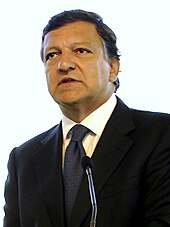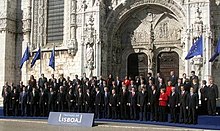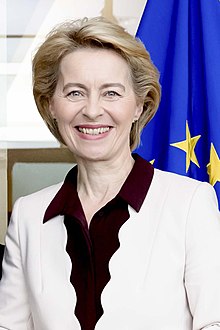History of the European Union (2004–present)
This article's factual accuracy may be compromised due to out-of-date information. (November 2017) |
| History of the European Union |
|---|
 |
|
|
The history of the European Union from 2004 to the present is the current timeline of the
Parliament and Commission

During 10–13 June 2004, the 25 member states participated in the largest trans-national election in history (with the second largest democratic electorate in the world). The result of the
Barroso I
The
Due to the victory of the
Other candidates were
During the hearings, members found fault in a number of Commissioners. Committees questioned the suitability of
The
Barroso eventually gave in and withdrew his proposed college of Commissioners and, following three weeks which left Prodi continuing as a caretaker, proposed a new line-up. There were three changes to help his dented authority and win the support of Parliament: Buttiglione had been withdrawn by Italy and replaced by foreign minister Franco Frattini, László Kovács was moved from Energy to Taxation and Ingrida Udre was withdrawn and replaced by Andris Piebalgs who took over the now vacant post of Energy.[10] The commission was approved on 18 November 2004, 449 votes in favour, 149 against and 82 abstentions, after Barroso gained the support of all three major parties and they took office on 22 November, three weeks after they were due to.[11]
2007
Romania originally proposed
Barroso II
The 2009 elections again saw a victory for the European People's Party, despite losing the British Conservatives who formed a smaller eurosceptic grouping with other anti-federalist right wing parties. Parliament's presidency was once again divided between the People's Party and the Socialists, with Jerzy Buzek elected as the first eastern European to become President of the European Parliament.
In 2008, Barroso had steadily won support from leaders for a second term as president, Nicolas Sarkozy and Silvio Berlusconi both declared their support for Barroso, though Barroso himself stated it is up to the political parties in Parliament.[16][17] On 19 July 2008 Barroso stated for the first time that he was seeking a second term[18] and was backed by the EPP for re-election.[19]
In the
In a meeting with the political groups on 10 September 2009, Barroso argued his new policies to a packed room with an unusually lively debate as Barroso defended his record against the Greens, his most ardent opponents. Despite holding his own in the debate he did not win support from the Greens. On 16 September 2009, Barroso was re-elected by Parliament by 382 to 219 (out of 718, with 117 abstentions).
Bulgaria's initial Commission candidate, Rumiana Jeleva, was forced to step down due to opposition from MEPs, mainly the Socialists, who questioned her suitability and financial interests despite backing from the People's Party (to which her national party belongs). Bulgaria rapidly submitted Kristalina Georgieva but this forced the vote on the commission to be delayed weeks so Georgieva's hearings could be arranged.[28] The only other commissioner-designate to lack support was returning commissioner Neelie Kroes, who was also seen to perform poorly in her hearing. However, she was invited back and secured more support, indicating she will get approval from Parliament.[29]
Parliament approved the new line-up on 9 February 2010 with 488 votes in favour. 137, the
Juncker
This section is empty. You can help by adding to it. (May 2020) |
Von der Leyen
This section is empty. You can help by adding to it. (May 2020) |
Institutional reform
Constitution

In 2003 the
The constitution proposed a number of changes. Although its powers were not extended, more decisions would be taken by majority voting and involve the Parliament. It did this by abolishing the
Rejection
The treaty was put to ratification in each member state. Every state had to approve it before it could come into force. In most, this was done by a Parliamentary vote (referendums are banned in Germany) but in others, it was put to a referendum. Spain was the first country to hold a referendum on the Constitution. The referendum approved the Constitution by 76% of the votes, although participation was only around 43%. On 29 May 2005 the French public rejected the Constitution by margin of 55% to 45% on a turn out of 69%. And just three days later the Dutch rejected the constitution by a margin of 61% to 39% on a turnout of 62%. Notwithstanding the rejection in France and the Netherlands, Luxembourg held a referendum on 10 July 2005 approving the Constitution by 57% to 43%. It was the last referendum to be held on the Constitution as all of the other member states that had proposed to hold referendums cancelled them.
Following the constitution's rejection by such central states, the EU leaders declared a "period of reflection" while they decided what to do next. This period ending with the
Lisbon

Agreement was reached on a 16-page mandate for an
The signing of the
The
Lisbon also abolished the pillar system, extending parliamentary oversight to the areas formerly under
Membership changes
Enlargement
In 2007, the
Negotiating process with
Proposed enlargement

The financial crisis hit Eurosceptic Iceland hard and its desire to seek haven in the EU and the euro led to it lodging its first formal application. Negotiations were expected to be concluded quickly. If disputes over fisheries were resolved and the Icelandic people consented, then Iceland would join. A new government was elected in Iceland during April 2013 and this government froze negotiations until a referendum could be held.[37]
In an ongoing program of enlargement, there were nine other candidates: Albania, Bosnia and Herzegovina, Georgia, Moldova, North Macedonia, Montenegro, Serbia, Turkey and Ukraine. Also within the enlargement agenda were the states of Kosovo.
Brexit
On 1 February 2020
Euro and recession
2007 saw Slovenia adopt the euro,[41] Malta and Cyprus in 2008,[42] Slovakia in 2009, Estonia in 2011, Latvia in 2014, Lithuania in 2015 and Croatia in 2023. However trouble developed with existing members as the eurozone entered its first recession in 2008.[43] Members co-operated and the ECB intervened to help restore economic growth and the euro was seen as a safe haven, particularly by those outside such as Iceland.[44][45][46]
However, with the risk of a default in
Migrant crisis
Impact of the COVID-19 pandemic

After the economic crisis caused by the COVID-19 pandemic the EU leaders agreed for the first time to emit common debt to finance the European Recovery Program called Next Generation EU (NGEU).[50]
Impact of the Russo-Ukrainian War
On 24 February 2022, after massing on the borders of Ukraine, the Russian Armed Forces undertook an attempt for a full-scale invasion of Ukraine.[51][52]
The European Union imposed
See also
- History of European integration (1948–1957)
- History of the European Communities (1973–1993)
- History of the European Union (1993–2004)
References
- ^ Vote EU 2004 news.bbc.co.uk
- ^ a b c d "Choosing a New EU Commission President". Deutsche Welle. 4 June 2004. Retrieved 26 November 2007.
- ^ "Two more candidates for Commission President". EPHA. 18 June 2004. Retrieved 26 November 2007.
- ^ a b "Commission president: Key candidates". BBC News. 27 June 2004. Retrieved 26 November 2007.
- ^ "The European Commission's new president has shown bold political judgement". The Independent. 13 August 2004. Archived from the original on 25 October 2007. Retrieved 26 November 2007.
- ^ "MEPs confirm new Brussels chief". BBC News. 22 July 2004. Retrieved 26 November 2007.
- ^ Bowley, Graham (22 October 2004). "EU deputies not swayed on Buttiglione : Barroso proposals fail to quell revolt". International Herald Tribune. Retrieved 23 November 2007.
- ^ Bowley, Graham (18 October 2004). "Buttiglione affair highlights evolving role of Parliament : Questions arise on democracy at the EU". International Herald Tribune. Retrieved 23 November 2007.
- ^ Bowley, Graham (26 October 2004). "Socialists vow to oppose incoming team : Barroso optimistic on commission vote". International Herald Tribune. Retrieved 23 November 2007.
- ^ Bowley, Graham (17 November 2004). "EU Parliament likely to accept commission : Barroso set to win with new team". International Herald Tribune. Retrieved 23 November 2007.
- ^ Bowley, Graham (19 November 2004). "MEPs approve revamped Commission". BBC News. Retrieved 23 November 2007.
- ^ a b c "Bulgarian, Romanian EU commissioners approved". Reuters. 12 December 2006. Archived from the original on 11 November 2007. Retrieved 23 November 2007.
- ^ "Kuneva to boost consumer confidence in business". EurActiv. 13 December 2006. Archived from the original on 8 February 2009. Retrieved 23 November 2007.
- ^ "EU's Barroso backs Romania's nominee for commissioner". EU Business. 30 October 2006. Retrieved 23 November 2007.
- ^ "Socialists criticise new commissioner's portfolio". EurActiv. 23 May 2007. Archived from the original on 16 May 2013. Retrieved 23 November 2007.
- ^ "Berlusconi backs Barroso to head EU Commission again". AFP. 9 July 2008. Archived from the original on 12 February 2009. Retrieved 16 July 2008.
- ^ Mahony, Honor (10 July 2008). "Sarkozy backs Barroso for second go as EU commission president". EU Observer. Retrieved 10 July 2008.
- ^ Mahony, Honor (19 July 2008). "Barroso admits he wants to be EU commission president for a second time". EU Observer. Retrieved 21 July 2008.
- ^ Taylor, Simon (16 October 2008). "Barroso wins backing for second term". European Voice. Retrieved 18 October 2008.
- ^ Mahony, Honor (13 June 2009) Socialists warn EU leaders to respect parliament on Barroso issue, EU Observer, Accessed 3 September 2009.
- ^ Simon, Joan Marc (23 March 2009) Barroso: the candidate of all European parties, European Federalists (Cafe Babel), Accessed 3 September 2009.
- ^ Mahony, Honor (2 September 2009) Barroso to publish policy programme for next commission, EU Observer, Accessed 3 September 2009.
- ^ Phillips, Leigh (28 August 2009) Parliament chief wants mid-September decision on Barroso, EU Observer, Accessed 3 September 2009.
- ^ Phillips, Liegh (10 September 2009) Barroso holds his own in spectacular brawl with Greens, EU Observer
- ^ a b Mahony, Honor (10 September 2009) Next commission set for human rights post, EU Observer
- ^ Mahony, Honor (15 September 2009) Barroso fails to convince critics in parliament speech, EU Observer
- ^ Mahony, Honor (10 September 2009) Commission president vote confirmed for next week, EU Observer
- ^ Mahony, Honor (19 January 2009) EU commission vote delayed as Bulgarian nominee steps down, EU Observer
- ^ Willis, Andrew (19 January 2009) Kroes performs better in second EP audition, EU Observer
- ^ Mahony, Honor (9 February 2010) EU votes in new commission after long delay, EU Observer
- ^ Banks, Martin (9 February 2010) EU commission wins seal of approval[dead link], theParliament.com
- ^ EU Leaders Adopt 50th Anniversary Berlin Declaration dw-world.de 25 March 2007
- ^ A New Treaty and Supplementary Protocols – Explanatory Memorandum (PDF), Brussels: Action Committee for European Democracy, 4 June 2007, p. 2, archived from the original (PDF) on 8 July 2007, retrieved 27 February 2009.
- ^ a b "Presidency Conclusions Brussels European Council 21/22 June 2007" (PDF). Council of the European Union. 23 June 2007. Archived (PDF) from the original on 27 June 2007. Retrieved 26 June 2007.; Honor Mahony (21 June 2007). "Stakes high as EU tries to put 2005 referendums behind it". EU Observer. Retrieved 26 June 2007.
- ^ "Romanian to Become EU's First Commissioner for Multilingualism". Deutsche Welle. 11 December 2006. Retrieved 18 January 2009.
- ^ "Croatia's Accession to the European Union". state.gov. Archived from the original on 21 January 2017. Retrieved 18 April 2018.
- ^ "Finish Line Promo Codes and Lacoste: A New European-American Partnership". publicserviceeurope.com. Archived from the original on 2 July 2013. Retrieved 18 April 2018.
- ^ McGee, Luke (31 January 2020). "Britain is leaving the European Union today. The hard part comes next". CNN.
- ^ "EU-UK Trade and Cooperation Agreement: Council adopts decision on the signing". Consilium. 29 December 2020.
- ^ "Notice concerning the provisional application of the Trade and Cooperation Agreement between the European Union and the European Atomic Energy Community, of the one part, and the United Kingdom of Great Britain and Northern Ireland, of the other part, of the Agreement between the European Union and the United Kingdom of Great Britain and Northern Ireland concerning security procedures for exchanging and protecting classified information and of the Agreement between the Government of the United Kingdom of Great Britain and Northern Ireland and the European Atomic Energy Community for Cooperation on the Safe and Peaceful Uses of Nuclear Energy". Official Journal of the European Union. 31 December 2020.
- ^ "Slovenia clear to adopt the euro". BBC. 16 June 2006. Retrieved 18 January 2009.
- euractiv.com. 16 May 2007. Archived from the originalon 18 October 2007. Retrieved 19 January 2009.
- ^ EU data confirms eurozone's first recession Archived 30 December 2010 at the Wayback Machine, EUbusiness.com, 8 January 2009
- ^ "European leaders agree crisis rescue at summit". Eubusiness.com. Archived from the original on 13 October 2008. Retrieved 2 January 2009.
- ^ Oakley, David and Ralph Atkins (17 September 2009) Eurozone shows its strength in a crisis, Financial Times
- ^ Iceland to be fast-tracked into the EU, the Guardian
- ^ Willis, Andrew (25 March 2010) Eurozone leaders agree on Franco-German bail-out mechanism, EU Observer
- ^ Eurozone overhaul Archived 14 February 2010 at the Wayback Machine Die Zeit on Presseurop, 12 February 2010
- ^ Plans emerge for 'European Monetary Fund' EU Observer
- ^ "Recovery plan for Europe". ec.europa.eu. ec.europa.eu. Retrieved 2 May 2021.
- ^ "Russia-Ukraine war: humanitarian corridor opened from Sumy; Moscow threatens to cut gas supplies to Europe". theguardian.com. theguardian.com. 8 March 2022. Retrieved 8 March 2022.
- ^ "In pictures: Russia invades Ukraine". cnn.com. cnn.com. 8 March 2022. Retrieved 8 March 2022.
- Bloomberg.com.
- ^ "Chelsea's oligarch owner is selling. Will scrutiny of other Premier League owners follow?". washingtonpost.com. washingtonpost.com. 8 March 2022. Retrieved 8 March 2022.
- Washington Post.
- ^ dw.com. 8 March 2022.


